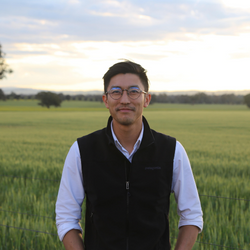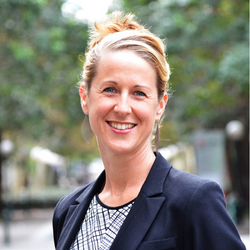Finding Australia's New Asia Narrative
By Prof. Michael Wesley
Deputy Vice-Chancellor International
Australia’s place and identity in the region is in flux. We all have an interest in fostering a rich, vibrant national conversation about what is important and how we should relate to our immediate neighbourhood.
As established narratives fray, countries emerge from the global pandemic, and modern Australia becomes increasingly diverse, we need new stories to shape how we are seen in the Indo-Pacific.
But from where do national narratives arise? To whom or what should we look to find our new Asia narratives?
Australia is a community of story-tellers, searching among our traditional cultural values, emerging intellectual trends, prevailing national and international moods, and cultural innovations for stories that locate us and give us a sense of direction.
Australia today has a larger and more diverse range of “narrative entrepreneurs” than in the past. The growth of universities and think tanks, consultancy firms and blogs has increased the number of voices telling stories about Australia, its region, and its national destiny.
We all have an interest in fostering a rich, vibrant national conversation about what is important, what we should change, and how we should relate to our immediate neighbourhood.
We also have an interest that our leaders — not just political but business, university, civil society and media leaders — are listening closely and contributing to this conversation. And that by some alchemy, as it has in the past, some animating narratives will emerge to guide Australia towards the next phase of its regional destiny.
Our regional future depends on the power of our stories.
Join the conversation via LinkedIn or Twitter using #NewAsiaNarrative.
Finding Australia’s New Asia Narrative was launched exclusively at the 2021 Asialink Leaders Summit.
Banner image: Crowd walks through Chinatown, Sydney, Australia - April 22, 2018. Credit: Shutterstock.
During the 2021 Asialink Leaders Summit, participants contributed their voice to this important conversation.

"It will be interesting to see how we form national narratives going forward, especially with the emergence of vocal groups, with at times opposing views (nationalists vs globalists, pre and post colonialists, pro vs anti 'insert country here', even moral or ideological views between countries, etc.). Social media has provided these groups with a platform to attract likeminded people and be quite vocal, to the point where the lines between fact and fiction can be blurred, and a fictional narrative can sometimes win over a factual one. With the 24hr news cycle, social media platforms and an increasingly more rapid change in global and political relationships, learning how to create a meaningful narrative in this environment will be complex task."

"I love the concept of narrative entrepreneurs [the growing number of voices telling stories about Australia, its region and its national identity] in this paper. Who gets to tell the stories and who listens, is key. To continue to make places and spaces, to provide platforms for exchange and dialogue around this, is of tantamount importance. The complexities of voice as acknowledged in the article, and the historical overview bringing us up to 'now', is crucial for us as we consider how we can contribute to the narrative of a future, that is one worth talking about."

"I thoroughly enjoyed reading through Professor Wesley's examination of Australia's changing narrative. I felt that it profoundly touches on a multitude of facets in which our narrative is formed (around a sense of deep connection to its Colonial past; security vs. economics, political ideals, bilateral ties, etc) and the heightened complexity (and moreover lack of public leadership) to reimagine a narrative.
My main reflection is about how we can earn the narrative that we believe can be reimagined. I believe this narrative must be mutual amongst our immediate neighbours and indeed global. It truly needs to reflect how the region views us and I believe that a narrative must evolve based on long-term mutual respect and trust. In a sense, I feel our narrative is one for us to reimagine, place guard rails (underpinned by values and actions, and consistency through both these), and most importantly earn. My concern though, which resonated with me in Michael's paper, is that we are placing little to no urgency, attention and resources back at home around our efforts around reconciliation and multiculturalism – and if we can't stand by this as individuals and leaders and believe we are doing so in our own backyards, it's hard to imagine that any Asia narrative for Australia, in the near future will hold much weight unless it is based on fear."

"Crikey! It's complex!
What is in 'Australia's best interest' (currently the Government's narrative is heavily skewed toward national security) may indeed contradict our national values. Perhaps to find a new narrative we need to find truth and divide the desire for sovereignty and national interest with a deeper understanding of who we want to be, what we represent and what we stand for as a nation.
The geopolitical landscape is rapidly and continuously changing. Our narrative has moved from 'Asian Century' to 'Indo-Pacific' to 'anti-China' and 'Quad' in less than a decade. The damaging impact this has had on our culture, social systems and beliefs, economic/trade and investment is substantial. It will take a committed and coordinated approach to change the narrative and move in the right direction. This is the responsibility of all of us, not one single entity."

"An outstanding paper!
Our narrative needs to align with “building with Asia”, not isolating ourselves by choosing sides. We definitely need to work with all corners of the globe to “balance China”. Peace, human rights and sustainability, as well as our economic prosperity should all be front and centre. The narrative of whether Australia should align to the US or China is a dangerous path for us to take and the government are making a real mess of this.
The business I manage specialises in working with manufacturing and distribution companies across the world, and I can tell you that the Aussie manufactures are really struggling to keep up with supply chain issues, largely caused by the current narrative surrounding our relationship with China. On the other hand, our customers in the other countries of SEA are all booming due to a more pragmatic narrative.
My wife is a school teacher and her students (children) are now feeling overwhelmingly scared of the possibility of war on our shores — whether it is simply fiction (and not really feasible) does not matter — the government and media frenzy of this narrative is currently inducing fear and potentially fuelling a new wave of racism which was largely stamped out in not so distant past narratives.
Being part of a global business, it is clear that the perception of Australia (from my colleagues’ point of view) is one of complete isolation from the rest of the world. They also feel that we have somewhat also isolated ourselves from our closest neighbours and business partners in SEA as well. Perception of our narrative to the rest of the world is fascinating to say the least. Let’s hope that the story tellers set a new narrative very quickly to get us get back on track!
This particular paragraph in the paper really stood out to me:
Australia’s periodic denunciations of China’s behaviour and intentions – however justified – isolates it from most of Southeast Asia, rather than drawing the region closer. While Southeast Asian states are concerned about China’s intentions and behaviour, none are prepared to join Australia in denouncing and opposing China’s behaviour. Their response has been to cultivate China, along with the United States, Japan and India as a way of balancing China and maximising their own freedom of action. Any attempts to polarise the region, for or against China, are seen as unhelpful turbulence in an increasingly uncertain regional outlook."

“A rich and accessible paper that cleverly weaves together key moments and actors in our recent relationship with the Asia-Pacific region. I agree that narratives are powerful and essential for leadership, but they come from values and visions which may or may not be explicit. While values are not mentioned as such, they are discussed in terms of security and economy and the tensions between them (which do we value the most?, are they mutually exclusive?, and what values are missed when these two factors monopolise the narrative?).
Perhaps a fourth danger of not finding a new narrative (Section 7) is that of Australia missing the opportunity to proactively contribute to peace, sustainable development, gender equality and inclusion, and human rights in the region. We are uniquely placed to support and contribute in these ways through partnerships and diplomacy. Without values, visions, and narratives driving in this direction, the opportunity will be lost (as will be the economic, social, artistic, knowledge and cultural benefits).
I like the language that Professor Wesley uses in his paper of 'being and becoming', because it is open, positive and aspirational. The call for the narrative to be shaped by a broader range of voices, beyond politicians looking for short- term local popularity, is salient for the Asialink Leaders community – a community that sees complexity, opportunity, and richness in our relationship with the region we live in.”

"A few initial reactions:
1. We are not alone in needing to find a new narrative. The 'sense of being' for many countries in the Indo-Pacific is shifting, and not all at the same pace and for the same reasons. Korea is transitioning from a developing to a developed country and in doing so is seeking more control over its future destiny. It is also charting its own path through the increasing tension between its security and economic partners.
2. From a historical, perspective I agree with the assertion that our Asia narrative had shifted from 'danger and separateness' to 'opportunity and integration'. I also agree that now, more than any other time in our history, we must not view the region with 'paranoia and insularity'. In fact, need to build even stronger and more resilient relations with our like-minded partners.
3. Narratives are extremely powerful diplomatic tools and need to be able to capture both the past and the future. For instance, Australia's contribution to the Korean War will never be forgotten but it will be our future connection points that will capture the imagination of younger generations. We need to chart a path of 'how we could become' together with our like-minded partners.
4. My personal view is that we now need a crystal clear overarching narrative for the region with a more nuanced set of supporting narratives for each country and groupings of countries in the region. Ultimately we need to be more sophisticated in how we engage.
5. Finally, I think the 'why' for a new narrative is clear, however the 'how' is far more complex and challenging. That is, 'how' do we, as an increasingly divided society, form, commit to and then clearly and consistently articulate a new narrative."